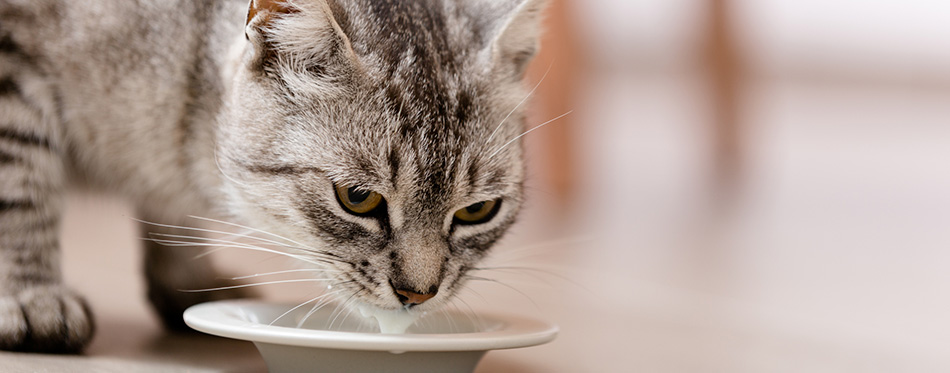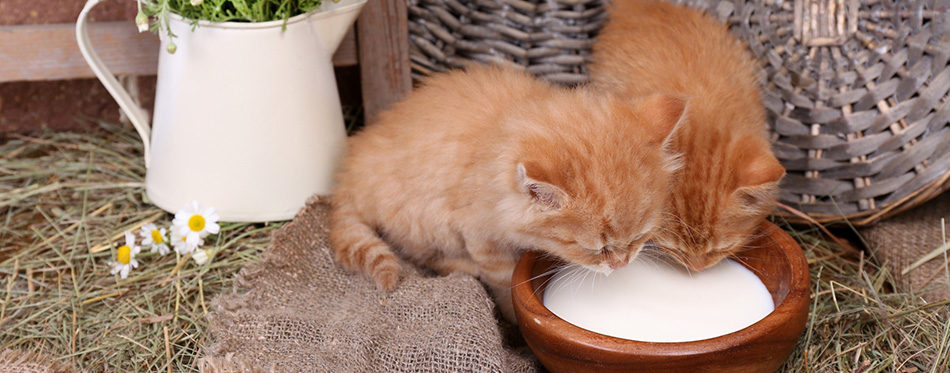Ah, cats and milk – a match made in heaven. Or is it? Despite many adorable illustrations found in children’s stories – you know, those of kittens lapping milk from saucers – cats and milk don’t mix well in real life. That’s because, like many humans, adult felines are lactose intolerant. But that doesn’t mean they can’t ever drink it, though – in small amounts, milk can be a beneficial treat even for adult cats.
Can Cats Drink Milk?
Like all infant mammals, kittens drink their mother’s milk until she gradually weans them at around 4-5 weeks. Naturally, kittens can digest the main sugar in milk, lactose, as it’s a valuable energy source for their growing bodies. They can do this thanks to the enzyme in their gut called lactase. Once they are weaned, however, the enzyme begins to disappear from their gut, meaning they slowly stop being able to properly digest lactose and, therefore, milk.
So, are cats lactose intolerant? It’s safe to say that most are. However, some cats retain the ability to digest milk sugar into adulthood, even for life.
What does this mean for your cat? Should you be serving milk from time to time or stay away from the creamy liquid forever?
Because most cats are indeed lactose intolerant, it’s a bad idea to feed them cow’s milk because it will just pass through their intestinal tract. As for the milk sugar lactose, the bacteria in the colon will ferment it, producing gas and causing discomfort and generally an upset tummy. Often, this will also lead to diarrhea and sometimes even vomiting. So, if you want to err on the side of caution, don’t give your cat cow milk, but if you’re up for some experimentation, keep on reading.

How to Check if Your Cat Can Digest Milk
Because there are some cats that can digest lactose even in their adulthood, many pet parents want to know if their kitty is one of them. Here is how you can check:
- Offer your cat a tablespoon or two of full-fat milk
- Wait for symptoms for one day
- If nothing happens (no diarrhea, vomiting, etc), chances are good your kitty can digest milk
- If you do notice a strange behavior (stomach upset, diarrhea, etc.), steer clear of milk.
Do bear in mind that even if your cat seems to be able to digest milk just fine, you shouldn’t offer it all the time. Cats don’t need milk to be healthy but they do require a host of other macro- and micro-nutrients, so never sacrifice a balanced meal like dry cat food or wet cat food for a bowl of milk.
How to Give Dairy to Your Cat
If your kitty loves milk and doesn’t seem to have any digestive issues when consuming it, it’s perfectly safe to serve it from time to time as a treat. Besides milk, cats can also consume yogurt and cheese; in fact, these may be better options for your cat than milk because they’re typically easier to digest. How is that possible, you ask? It’s quite simple – different types of dairy (cheese, milk, yogurt, cream) contain varying amounts of lactose, so some are easier on the stomach. Another reason why yogurt and cheese are easier to digest is because they’re cultured – they contain beneficial bacteria that help your cat digest food more easily. So, if your kitty is slightly sensitive to milk but really loves drinking it, switch to cultured yogurt or cheese (but in moderation, of course).
Just remember that all treats, including various “people foods” like cheese, tuna and milk, should make up no more than 10% of your pet’s diet. The rest of the calories should come from a balanced diet, meaning good-quality cat food. This is an important rule to follow because if you start over-feeding your cat, it’s more than likely they’ll gain weight, and with it, increase their risk for developing diabetes and other health problems. Find out more about cat food for weight loss here.
Is Milk Healthy for Cats?
Alright, so your kitty enjoys drinking milk and has no problem digesting it. The question remains: is milk bad for cats or is it healthy?
For adult cats who remain able to digest lactose in their adulthood, milk can be a part of a healthy diet. However, this is only possible if it’s given as a treat, meaning in small amounts and infrequently.
As for lactose intolerant cats, they shouldn’t be given milk – ever. If your pet is unable to digest lactose, they will never suddenly become able to, not even if you give them milk regularly. This can only lead to an upset tummy, bloating, gassiness and diarrhea. In some cases, lactose intolerant cats will also vomit after ingesting milk.
Kittens and Milk
Clearly, most adult cats shouldn’t be fed cow’s milk, except as an occasional treat, and only if they’re able to digest it. But what about kittens?
While they have the enzyme lactase in their gut which helps them digest their mother’s milk properly, there is not enough of it to handle the lactose overload found in cow milk. And that’s only a part of the problem – another issue is the casein to whey ratio found in dairy. Simply put, kittens are not able digest cow milk properly, so feeding it can cause diarrhea and dehydration, which can quickly become a serious problem.
If you own or you’ve found kittens who need food to survive (there’s no mother around), instead of feeding them cow’s milk, give them kitten milk formulas. This is a special kind of milk, one that is specifically made for kittens and it can be found online, in pet brick-and-mortar stores or at your vet. While many kitten milk formulas contain at least small amounts of cow’s milk, this milk has been modified to match the nutrient profile of a cat’s milk. For one, it has a reduced amount of lactose, and two, it has an adjusted ratio of whey and casein. It also has added supplements needed for proper a kitten’s proper development. Check out our guide on kitten food for your cat for more info.
What About Goat Milk?
Many cats have an easier time digesting goat’s milk than they do cow’s milk because it has a softer and smaller casein curd, along with smaller fat globules. This makes it easier on the gut, especially the small bowel, as it leaves less residue to ferment. So, when drinking goat milk, most cats – even those slightly sensitive to cow milk – will digest it fine and will not suffer from bloating and gassiness.
Fermented goat milk is even better as it’s easier to digest. This is because it contains even less lactose and that which is present was broken down by the fermentation process. On top of this, goat milk contains a complete array of amino acids, vitamins and minerals needed for health and well-being of pets, including cats. In fact, some veterinarians use fermented goat milk to treat pets with inflammatory bowel disease!
Here are a few health benefits of goat milk for cats:
- Contains vitamins, minerals, enzymes, amino acids, electrolytes, fatty acids and protein
- Thanks to its nutrient-rich content, it helps boost the immune system
- It supports healthy digestion
- It helps lower various types of allergies, including environmental allergies
- It’s a healthy and nutrient-rich way to spice up your cat’s diet.
Despite all the wonderful benefits, even goat milk isn’t healthy when fed constantly or in large quantities. If you want to feed your kitty raw goat milk, treat it as a supplement or as a treat. Unlike cow milk though, you can serve raw goat milk daily, but do make sure it’s in small amounts – about 1 ounce for pets weighing up to 10 pounds. It should also be mentioned that, like any new food, goat milk should be introduced slowly. Start with the smallest amount possible and increase gradually if you and your kitty want to. Head over to our review of vitamins for cats for more options

The Conclusion
So, do cats drink milk, and more importantly, should they? Many, if not all cats will jump on the opportunity to drink some fresh milk, but that doesn’t mean that they should. Most cats are lactose intolerant, meaning they lack the necessary enzyme to properly digest milk sugar lactose, so consuming commercial cow milk can lead to all kinds of health issues, including bloating, gassiness, stomach pain, diarrhea and even vomiting. Similarly, kittens shouldn’t be fed cow milk because even though they may still possess the lactase enzyme in their gut, it’s not enough to tackle the overload of lactose found in cow milk. That’s why kittens should always be fed milk replacement formulas.
That all being said, if your cat likes milk and appears to have no problem digesting it, it’s fine to serve it occasionally in very small amounts as a treat. If you want to make sure your pet is healthy at all times though, it’s probably a better idea to feed goat milk instead of cow milk, as it contains less lactose, has a better casein to whey ratio, and contains a host of beneficial micronutrients.
Whether you’re considering giving cow or goat milk to your cat, discuss it with your vet first.
Source:
- Feeding Your Cat – Cornell Feline Health Center

